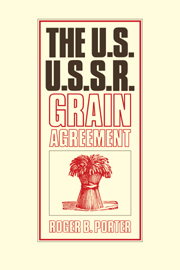Book contents
- Frontmatter
- Contents
- Foreword
- Preface
- List of acronyms used in the text
- 1 Introduction
- 2 U.S.–Soviet grain trade before 1974
- 3 The 1974 experience
- 4 The Russians return
- 5 First steps
- 6 A strategy emerges
- 7 Agreement to seek a long-term arrangement
- 8 Refining the details
- 9 Ebbing leverage: the waiting game
- 10 Evaluations
- 11 Reflections
- Epilogue
- Appendices
- Bibliography
- Index
4 - The Russians return
Published online by Cambridge University Press: 05 November 2011
- Frontmatter
- Contents
- Foreword
- Preface
- List of acronyms used in the text
- 1 Introduction
- 2 U.S.–Soviet grain trade before 1974
- 3 The 1974 experience
- 4 The Russians return
- 5 First steps
- 6 A strategy emerges
- 7 Agreement to seek a long-term arrangement
- 8 Refining the details
- 9 Ebbing leverage: the waiting game
- 10 Evaluations
- 11 Reflections
- Epilogue
- Appendices
- Bibliography
- Index
Summary
In early 1975 Henry Kissinger asked Charles W. Robinson, the recently appointed under secretary of state for economic affairs, to meet with the senior Soviet economic officials in Moscow. There were no pressing unresolved economic issues between the two countries, but Kissinger wanted Robinson to size up his Russian counterparts and to get a feel for the world of diplomacy. Robinson, a successful California businessman, was new to government and anxious to demonstrate his negotiating skills. Moreover, he wanted to establish himself more solidly in the State Department firmament. Although nominally the leading economic official in the department, Robinson had only a very small staff under his direct control. Most of the economic expertise was in the Bureau of Economic and Business Affairs, which reported to Assistant Secretary Thomas O. Enders. Enders, who had a close personal working relationship with Kissinger, was both intellectually brilliant and bureaucratically savvy. At the outset, the Robinson–Enders relationship was left somewhat vague and undefined. Kissinger decided to give Robinsona variety of differing assignments, many of them involving travel abroad, and test his performance.
One of the main issues on Robinson's Moscow agenda was whether the Russians would participate in the international grain agreement negotiations in London. The State Department was pressing for an international grain reserve to ease the U.S. stockpiling burden.
- Type
- Chapter
- Information
- The U.S.-U.S.S.R. Grain Agreement , pp. 33 - 42Publisher: Cambridge University PressPrint publication year: 1984

